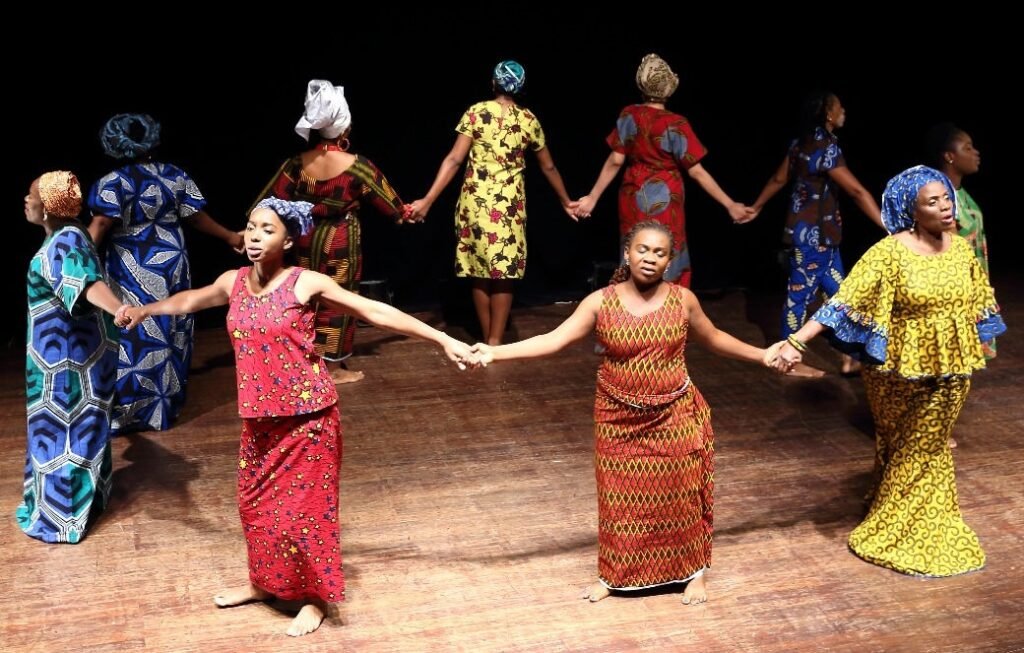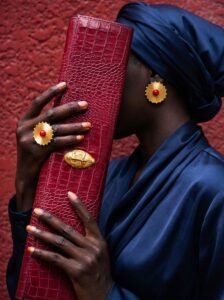Madam Obunse
PICTURE – Miriam Ebele
On November 19, 2022, the train stopped in Benin City, Edo State, Nigeria, for another electrifying performance. The stage was set and, by show time, the Victor Uwaifo Creative Hall was brimming with theatre-goers craning their necks to catch a glimpse of the performers. One of the women in the audience was Miriam Ebele. While others were cheering, she allowed tears to freely trickle down her cheeks. Over a phone call, she recounted her experiences to me. At the age of 19, Miriam was preparing for her university entrance exam, however her parents had different intentions. In a bid to foster family ties, she was made to forgo her educational pursuit and tie the knot with a man she had no atom of love for. The huge age gap aside, he had a decent job and good prospects. Miriam gave in to her parents and assumed the title “Ovbiaha”, a traditional name signifying marital commitment. She moved into her husband’s house with the hopes of adjusting and building a home.
“The first five years were amazing,” she says. “He genuinely cared and provided for every need. We had a son, and I was pregnant with another. I couldn’t further my education, but I got a job as an auxiliary nurse and I was earning some pay to support our home.” But her husband didn’t want the support; instead, he wanted Miriam to be a full-time house wife: “He believed every woman must stay at home and do chores, that working and earning money would make a woman disrespect him—especially contributing money to pay bills. He suddenly changed into a monster.” Miriam was defiant and disdained staying at home. She continued her work and, with time, the relationship turned physically abusive, culminating in a tragic miscarriage for Miriam.
“It was the most devastating thirty minutes of my life. I cried in pain and even though I did not want to accept the truth, it was glaring. I had lost a blessing that God gave us. I had lost my child.” Miriam has moved past the harrowing experience and separated from her now-ex-husband. For her, Hear Word! Naija was the perfect way to reflect on the dark times she had overcome.
PICTURE – Anonymous
Also present in the Victor Uwaifo Creative Hall that night was a 24-year-old student from the University of Benin. She chose to remain anonymous but spoke to me about how the play resonated with her. “I was 11 when I lost my father,” she says. “Surviving in the hood wasn’t easy; I could see how much my mother was struggling to meet our needs. When it became an uphill task to eat two square meals, she sent me to my aunt’s house to stay with them for a while.” The decision, made in good fate, would haunt her for the rest of her life. She recounted how her aunt would travel for social meetings, leaving her alone in the house with her aunt’s husband. She had caught him staring strangely but didn’t read into it because, as she states, she had “looked up to him as a father figure. He always protected me and made sure I never lacked anything. But that night, everything changed when he snuck into my room. No one was in the house and he had his way with me.”
She tried several times to speak up, but no one believed her and they brushed the topic aside every time she brought it up. Just like Mariam, she has grown and moved past the terrifying experience, but time has not erased the memory.
The women in the crowd at Hear Word! didn’t need a reminder of their pain—instead, they received a warm hug and a pat on the back, assuring them that they were not alone. As the play wound into its last act, there was a palpable sense of hope to every woman gathered in the hall. The performers marched out on stage and proclaimed: “Enough is enough! We are women and not mannequins!” The audience responded with a standing ovation. As they flocked out of the hall with huge grins and excited chatter, it was obvious the play had left its mark and inspired hope once again.





